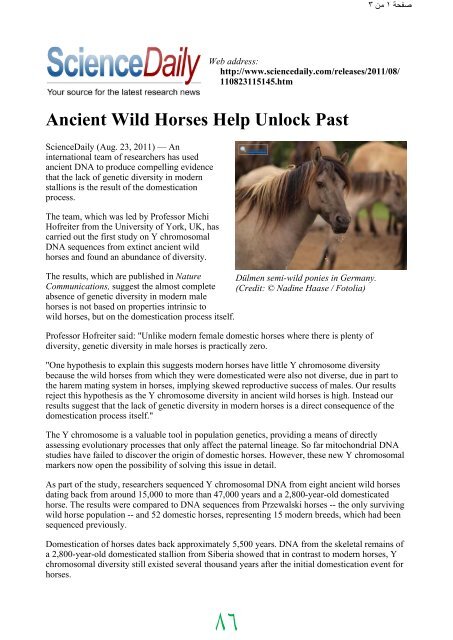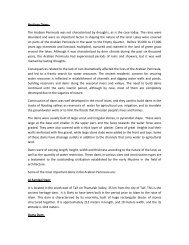ﺧïºØ¯Ù اï»ïº¤ïº®ï»£ï¯¿ï»¦
ﺧïºØ¯Ù اï»ïº¤ïº®ï»£ï¯¿ï»¦
ﺧïºØ¯Ù اï»ïº¤ïº®ï»£ï¯¿ï»¦
You also want an ePaper? Increase the reach of your titles
YUMPU automatically turns print PDFs into web optimized ePapers that Google loves.
86<br />
http://www.sciencedaily.com/releases/2011/08/110823115145.htm<br />
صفحة ١ من ٣<br />
٣٢/٠٩/٢٧<br />
Web address:<br />
http://www.sciencedaily.com/releases/2011/08/<br />
110823115145.htm<br />
Ancient Wild Horses Help Unlock Past<br />
ScienceDaily (Aug. 23, 2011) — An<br />
international team of researchers has used<br />
ancient DNA to produce compelling evidence<br />
that the lack of genetic diversity in modern<br />
stallions is the result of the domestication<br />
process.<br />
enlarge<br />
The team, which was led by Professor Michi<br />
Hofreiter from the University of York, UK, has<br />
carried out the first study on Y chromosomal<br />
DNA sequences from extinct ancient wild<br />
horses and found an abundance of diversity.<br />
The results, which are published in Nature Dülmen semi-wild ponies in Germany.<br />
Communications, suggest the almost complete (Credit: © Nadine Haase / Fotolia)<br />
absence of genetic diversity in modern male<br />
horses is not based on properties intrinsic to<br />
wild horses, but on the domestication process itself.<br />
Professor Hofreiter said: "Unlike modern female domestic horses where there is plenty of<br />
diversity, genetic diversity in male horses is practically zero.<br />
"One hypothesis to explain this suggests modern horses have little Y chromosome diversity<br />
because the wild horses from which they were domesticated were also not diverse, due in part to<br />
the harem mating system in horses, implying skewed reproductive success of males. Our results<br />
reject this hypothesis as the Y chromosome diversity in ancient wild horses is high. Instead our<br />
results suggest that the lack of genetic diversity in modern horses is a direct consequence of the<br />
domestication process itself."<br />
The Y chromosome is a valuable tool in population genetics, providing a means of directly<br />
assessing evolutionary processes that only affect the paternal lineage. So far mitochondrial DNA<br />
studies have failed to discover the origin of domestic horses. However, these new Y chromosomal<br />
markers now open the possibility of solving this issue in detail.<br />
As part of the study, researchers sequenced Y chromosomal DNA from eight ancient wild horses<br />
dating back from around 15,000 to more than 47,000 years and a 2,800-year-old domesticated<br />
horse. The results were compared to DNA sequences from Przewalski horses -- the only surviving<br />
wild horse population -- and 52 domestic horses, representing 15 modern breeds, which had been<br />
sequenced previously.<br />
Domestication of horses dates back approximately 5,500 years. DNA from the skeletal remains of<br />
a 2,800-year-old domesticated stallion from Siberia showed that in contrast to modern horses, Y<br />
chromosomal diversity still existed several thousand years after the initial domestication event for<br />
horses.
















